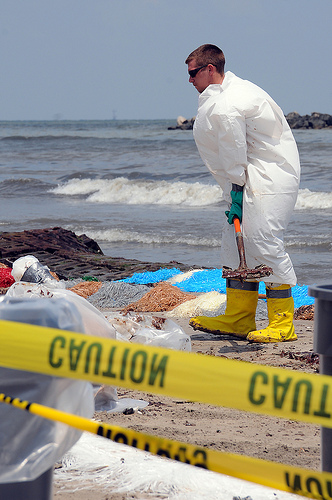 Today, its Top Kill or bust. Never have the stakes for BP been higher.
Today, its Top Kill or bust. Never have the stakes for BP been higher.
Latest estimates are that the company could face up to $70 billion in penalties and pay-outs for the Gulf oil spill if today’s attempts to stem the flow of oil fail.
Today BP will attempt a “Top Kill” – pumping heavy drilling mud and concrete into the hole. The company acknowledges that it only has a 60-70 per cent chance of being successful.
If it is, BP will argue that we are at the beginning of the end of this disaster. It will bombard the American public with adverts saying the crisis is over.
We know it is not – as the full extent of BP’s spill is largely unseen and out of sight, and will take months if not years to become apparent. As one environmental cameraman said yesterday: ‘If Exxon Valdez was a heart attack, Deepwater is a cancer’.
If the Top Kill fails and the procedure makes the spill worse – BP’s nightmare may only just be beginning. And the legal bills and penalties will be staggering.
BP’s so-far silent Chairman, Carl-Henric Svanberg, has finally found his tongue. He told the Financial Times that whilst BP’s reputation had suffered damage, that should not last long “if we do the right thing”.
Svanberg will know that it is not as simple as that.
The damage done to BP’s reputation is immense. But can it survive the legal fall-out?
Amazingly BP had no external insurance in place for the accident. So the company is trying to be sneaky by claiming up to $700 million through a policy held by Transocean, the owner of the Deepwater Horizon rig.
However yesterday almost half the syndicates in the Lloyd’s of London insurance market launched a legal action against the company to stop them doing this.
In legal documents filed in a Houston court, The Times notes that “38 separate Lloyd’s underwriting syndicates plus a string of other international insurers affected by the disaster, have asked a US judge to declare the group has ‘no additional-insured obligation to BP’ for the clean-up or for any damages resulting from the spill.”
But that is only part of the picture. The Times reports that analysts for Swiss Re have estimated that the total insured losses from the accident could reach $3.5 billion. However, according to UBS, the final bill could be as much as $12 billion.
The Guardian also says that penalties from the US government could come to $60bn. This is in addition to the clean-up costs and pay-outs.
The Guardian has obtained a confidential briefing, from a top-level US environmental lawyer who specialises in oil industry litigation, to stockbroker Canaccord, assessing the financial impact of impending legal action on BP.
He warned that, under US law, BP is liable for $1,100 in civil penalties for each spilt barrel of oil and gas. The Guardian notes: “If BP is found to have acted with gross negligence – and there is no evidence so far that it has – this fine would rise to $4,300 for each barrel.”
No wonder that BP has so far refused to say how much oil has been leaked. If we knew the true figure, it could spell real trouble for the company.
As the Guardian notes: “ BP would be liable for $60bn in civil penalties if oil continues to leak at the highest estimated level for the next two months, when a relief well being drilled to plug the reservoir is completed”.
So it could be Top Kill or Bust for BP….

I do not believe that the penalties should even exist. More oil is spilled in Nigeria on the ground every year than the oil leak has produced in the gulf. If it was not for the anti oil policies of the USA then oil could have been obtained on land wells or wells closer in to shore and in shallower water. Now is not the time to be doing Penalize BP but what can we discover to fix it and stop other wells from happening again. When the land oil is gone we WILL go back to ocean oil because we have to but this could develope the technology to do it more safely.